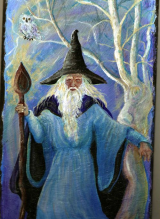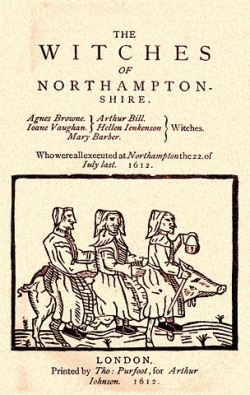A History of Magic
The history of magic in the British Isles is long and varied. It is believed that magic has always been here, stronger on these islands than in many other places in the world, but before 1735 most written records of it have been destroyed, or are not entirely trustworthy. Since then, the magical community has been operating in secret, and the Schools have become even more disparate than they previously were. Most Wytches will know their own School's history since 1735, and some schools have been better than others at preserving records from before that time - the library at Bedivere Hall, for example, contains some of the few remaining tomes with reliable details of magic use dating back to the 12th century. Beyond this, however, most of the detail of early times given below is oral tradition only.
Myths and Legends
Little is known of early magic use, but some hints remain to us. Far back in the early days of civilisation, it seems possible that Wytches and Norms co-existed fairly peacefully, since Wytches had skills which were helpful to survival. In early Britain (or its constituent parts), no concrete record remains of what the role of everyday magic may have been, although some Roman curse tablets found in Bath show that it was possibly present and known of.
In later times, the Norms' tales of Arthurian legend hint at a world where magic was in the ascendancy, where a Wytch by the name of Merlin could create great magical wonders and be revered as a hero, and where lake spirits just hung around waiting to catch magical swords thrown at them. Even in Wytch society, no-one is sure if Camelot really existed, or where it might have been, but it stands as a beacon of times when magic was acknowledged and intrinsic to the power of a kingdom.
Few records of magic remain from the Middle Ages following this time, but it seems like a period when magic was quiet across the country - perhaps the collapse of Camelot left Wytches in disarray, or perhaps it was simply not deemed worthy of mention in the few texts that remain to us today.
Witch Trials
From around 1500 onwards, the Norm world started to become suspicious of 'witches'1). Various Witchcraft Acts were passed which made it a prosecutable offence, and the notorious Witch Trials began, bringing suffering to many innocent magical families.
The Hammer
Long before the days of Her Majesty's Magical Regulator and governmental oversight, various people's militias formed throughout the country to deal with this newly perceived threat. Originally, towns would deal with their own suspected magical users in their own ways, through charming olde-worlde punishments such as public humiliation in the stocks, attempted exorcisms by inept local priests, and the classic 'chase them out of town with pitchforks'. Over time, however, small groups of career 'witchfinders' became established around the country, communicating with each other to learn all the best new ways to detect these pernicious evildoers in their midst. While Norm society these days treats most of these methods with ridicule, drowning/burning/torturing/hanging accused 'witches' was an extremely harsh punishment for those who had merely been trying to serve their local communities with their magical skill (not to mention, of course, the Norm casualties accidentally accused of such things, who had even less chance of escape).
The mostly disorganised rabble-rousing of the 1500s escalated into the rather more terrifying and methodical persecution of the magical community in the middle of the 17th century, spearheaded by none other than 'Witchfinder General' Matthew Hopkins, still a name to strike fear into the heart of many a modern Wytch. Formally amalgamating the various disparate groups of 'witchfinders' into a single, organised group - the Hammer - the result was devastating to Wytch communities across Britain. He and his associates managed to convict and execute a hundred people a year in the east of England - roughly one execution every three days. Even the best of Wytches can eventually be brought low by such a determined and resourceful enemy, and the one thing that should never be forgotten about Norms is their sheer weight of numbers compared to the relatively scarce Wytches - even powerful mages can be taken by surprise and killed by methods which their magics cannot affect.
The Accord of 1735
The Witchcraft Act of 1735 repealed earlier Witchcraft Acts under which being a Wytch was illegal, instead replacing them with laws allowing the prosecution of anyone who claimed magic was real. This change in Norm culture came about through an agreement between the Hammer and the heads of the magical Schools at the time. Witch Trials had become more difficult over recent years as Wytches became better at hiding, and an age of rationality and reason took hold amongst the Norm populace, most of whom now actually did not believe in the existence of magic. This was probably due to a combination of factors - it is certainly true that, amongst other things, far fewer extravagant uses of magic are recorded in the early 18th century than in previous years - nothing on the scale of the Gunpowder Plot or the Fire of London, for example. (Why is it always Pyromancers, every other school wonders…) This is probably because anybody with that little control over their magic or desire to hide had already been caught and prosecuted by the Hammer by this point, but its effect was to stop most Norms fearing magic in the same way they had before.
The agreement reached was that the Hammer would cease their attempt to eradicate magic users entirely (and would be taken under nominal government control), if the Wytches would vow to remain a hidden society, staying below the radar of Norm awareness and never attempting to seize power. Relations were not exactly friendly to begin with, but eventually everyone settled down into a bureaucratically peaceful relationship similar to that between the Norms and their Police - any Wytches who threatened the code of secrecy would be caught and subdued by the Hammer, sometimes being imprisoned for a while.
Status Quo
(See also Wytch Society)
Until recently (see Covens and the Current Situation), therefore, Wytches and the Hammer (now a small, secret arm of the government's internal security forces) have been co-existing in relative peace. Many of the low-level Hammer agents spend their time identifying magical children within the Norm population when they start accidentally disintegrating the class hamster or freezing their playmates to their seats, and funnelling them into the appropriate Wytch school. Almost all Wytches are registered on the Hammer's books, and their official documents reflect this - with Hammer authorised blood tests used to find Wytches who apply for such documents as Driving Licenses and DBS Certificates. It is still the case that Wytches are prohibited from holding governmental posts or being in positions of power within the wider Norm society, but generally speaking this has not been found to be too much of an imposition: those who want power usually want the recognition and respect for their magic that could not be found within Norm society anyway, so they gravitate to positions of power within their Schools instead.


